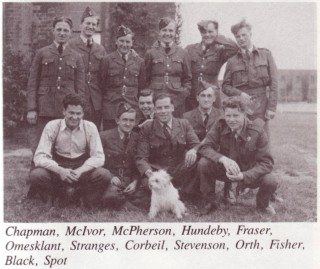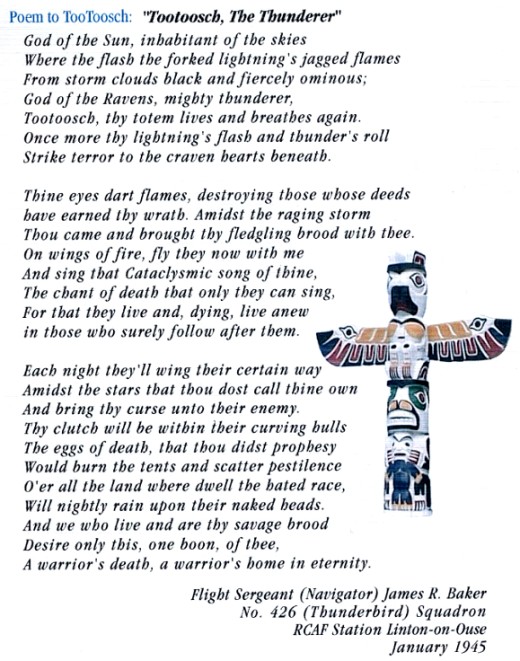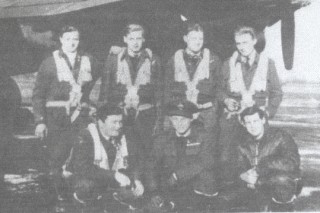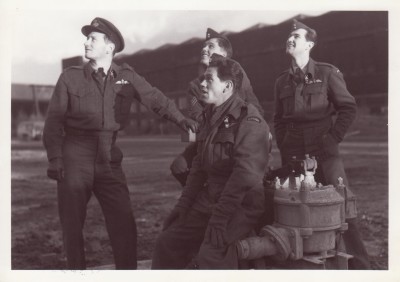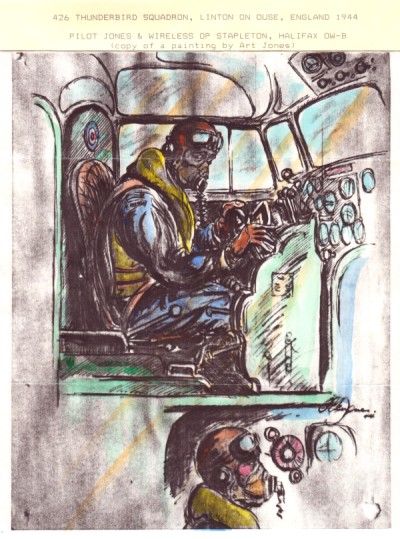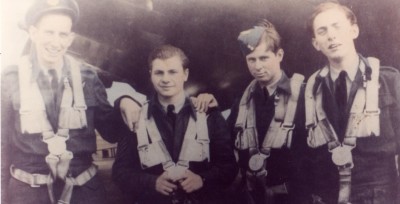Poems
An Airman's Prayer
Dear God in Heaven, to Thee we pray To keep our loved ones day by day; May we, who serve Thee up above, Thus rightly earn their pride, their love.
Bless all our homes, though long since seen, Where we for years have happy been. May we return ere years have passed. When wordly peace has come at last.
And if at times vile Death we fear, Then may we feel that Thou art near; O guide us through the flame-swept sky Unto Thy heavenly throne on high.
Grant then, that we, who soar above, May soon return to those we love, Knowing that, when we trust in Thee, Then shall this troubled world be free.
by F/O J. Lewis, DFC This poem was put to music by P/O K. Nordheimer, a crewmate of Lewis, both of whom were part of S/L Millward's Lancaster. First performed as a hymn, 3 Oct 43, by Cpl Pamela Rich, WAAF. The Thunderbird On wings of fire to sally forth East and west, south and north, To the many lands beyond the sea, In the name of our democracy. Cross burning desert stark and bare, Parched by the sun's relentless glare, Filling the vastness with its sound Thunderbird on lonely mission bound. O'er steamy jungle, verdant green, Slashed by sluggish winding stream, Sleepy village wakened by Roar of engines in the sky. By rugged mountain peaks which free White foamed torrents to the sea, Sombre volcano comes to sight Spewing pumice into the night. Above trackless oceans emerald green Flecked with whitecap or serene, Lead to lands both near and far, Guided by sun or friendly star. To lonely outpost cloaked in white, Locked in the frozen arctic night, Awesome glacier suddenly frees, Massive iceberg to the seas. Plunging through storm and thundercrash Blinding rain and lightning flash; Or sealed for hours in the clouds' gray walls, Thunderbird flies where destiny calls. Though countless miles destined to roam, Thunderbirds' thoughts oft' turned to'rd home, Lord of the universe, guide the way To haven ere the end of day. LCOL Larry Motiuk (Ret'd) |
The Erks* Lament When we get up in the morning And wander out to work, There's one thing sure and certain, To every bloody Erk-- When your D.I.'s are finished, Spindloe is sure to say, "Did you drain your sumps this morning?" In his sneering sort of way. Then up the "Panic Wagon" rolls. And out jumps little Joyal, He takes a filter out himself, To see if it needs oil. A rumor is abroad as well, That "C" Charlie's revs are low, So out comes F/L Klassen, And grins as if he'd know. And when she bangs and sputters It's sure as hell he'll say, "It must be in the filters, Did you drain your sumps today?" If points are bad or pots are duff, Or revs are high or low, "Have you drained the bloody filters?" Is the only thing you know. And so it goes from dawn to dark, No matter what is wrong, "Have you drained the bloody filters?" Is the Panic Squadron's Song. by LAC Charlie Robie Fisher "A" Flight Fitters, 426 Squadron
* Note: an Erk was a short form of Aircraftsman, from the Cockney "Erkrafsmun" |
| |
This poem was composed by Phil Eyles, Niagara Falls, Ontario, who served with No 426 Squadron during the Second World War. He explained it thus; "I wrote the poem in a short time, as the terrible memories came flooding back. I have tried to put into words what an operation was really like, but of course one had to be there to know the terror we all felt as we battled our way to and from the target." | |
back row (l to r) W.A. Dell, mid-upper gunner, P. Eyles, wireless operator, R. Peters, navigator and D. Hayes, flight engineer front row (l to r) R. Robinson, bomb aimer, J. Fidler, pilot and A. Barker, rear gunner | Ops are on, the station sealed, No Tannoy testing 1-2-3 To say ops are cancelled for to-night It's briefing time, the crews all wait With curtain closed, the target hidden. Tense nerves are raw, the talk is loud The room is full of smoke. Suddenly the curtains drawn, And shows the target for to-night. Sharp indrawn breath denotes bad news, A long deep German target Means Death will stalk the skies to-night. A briefing follows, then the weather, No clouds to-night, we cannot hide from fighters all around. At last we cross the German coast. The searchlights sweep, the flak explodes And fighters join the stream Just searching, searching, searching. Suddenly an exploding flame, a bombers gone And seven men just died. There is no idle chatter, just terse commands. The night is dark, you feel alone As slowly to the target our bomber drones. There it is, a sea of flame, a cauldron of hell But the bombing run must be straight and true. No turns here, just go right into a sea of flak. The Bomb Aimer calls steady, left left, steady. The Bomb doors open and we hear "Bombs Away", The plane leaps up And Death is on its way. Our job is done, but still we fight As planes around us flare and fall. Fighters are in the bomber stream The cannon shells explode, And again Death stalks the skies As we have just sent Death to those below. At last the coast, we made it out And to our base we fly and land. With faces pale, we are de-briefed And then its time to eat. Bacon and eggs, but much too tired Just get to bed and hope to sleep. All 7 men of Fidler's crew saw hell to-night As they flew as one to survive And fly again another night. |
Watching a Lanc overhead (l to r) standing F/L M. Wilson, pilot, F/S W.A. Park, air gunner, and F/O B.J. Huges, pilot, seated Sgt A. Carlson, air gunner. On the night of 27-28 Jan 44, during a raid on Berlin, OW"U" was shot down by a night-fighter. Wilson bailed out and was captured, Carlson and Park died in the crash. If you have a photo of P/O Bain that we could include here please contact us. | This poem was published in Wings Abroad sometime in 1943 under the column "Oscar the Bard". I'm keen, very keen, and I'm anxious to fly. The weather's not fit? Not a bit? My, oh my! Eight to ten tenths of the blackest of cloud? It's horrible fiendish, it can't be allowed. And here I was all set for a night on the Ruhr, But now I stay home - very sad to be sure. A whole evening free and there's nothing to do, Except for the Bull and a pint - maybe two, Or, that book in the mess that I've only half read, Perhaps, for a change, going early to bed, Or a picture in town and a restaurant meal, (How much would I rather a jaunt over Kiel) I really don't care very much for the rest, I'd much prefer Hamburg, or Bremen, or Brest. The weather is clearing? We may even fly? Impossible! Stupid! Why look at the sky. The front has passed over you're sorry to find? Well, what about me - my God, what a bind. I've a date, I feel ill, my kite is u/s. My aunt has just died. My nerves are a mess. Gotta have time off, just one evening free. Not very keen? Why - who d'ya mean? ME?
By P/O George Bain |
Part of a Halifax crew (l to r) Harry Whitcombe, navigator, Ed Brennan, rear gunner, Ken Britton, bomb aimer, and Ellis Percival, flight engineer. These men survived their tour with 426 Squadron. | "A" FLIGHT AIRCRAFT - 426 "A" is for Able; you know she's hoodoo, For each op she goes on She stays at home two, Her ground crew are lazy, Her aircrew are poor, She's safer at home, Than over the Ruhr. "B" is for Beer; you know her well She will fly with the best, On the far side of hell, With hydraulics and coolers, Her ground crew go crazy She has to get home For she can't land away. "C" is for Charlie; the best she can do Is some local stuff Across country or two. She flies like a swallow With a man at the wheel But throw her in "George" And she dives like a seal. "D" is for Dog; that veteran of craft By day and by night She fools the Luftwaffe. Her crew is so keen To keep her aloft They are always at work They will never buzz off. "E" is for Easy; it may be foul play If she's not in the hangar She's landed away. Cupid's sharp arrow The ground crew has bit, If they're not away courting They'll be in the pit. "F" is for fox; of ops she has some She'll fulfil her mission And back home will come. They say in the air Her stuff she will do She has a Corporal, a Rigger, And Fitters - a few. "G" is for George; on the banjo she sets, No telling for sure, If she's been on ops yet. Her Fitters will panic By night and by day - Could send her tonight But her Rigger's away. "J" is for Jig; so shiny and sleek We feed one to Heinie, About once a week. If they're at a loss And forget what to do, They whip in the bush And run off a brew. "K" is for King; she can climb very high There's no Messerschmidt Can touch her in the sky. Although it is seldom, That she ever goes, And why she flies at all God only knows. "L" is for Love; with quite a few ops, Quite a few starts And a good many stops. The Fitters are stupid, And Riggers are slow They don't worry about snags They just send for Joe. "M" is for Mike; her carbs are all set Her mags are adjusted She may take off yet. If the Fitters can leave Their buckshee long enough, To fix up those pots, That are sure to go duff. This poem is believed to have been a Thunderbird group effort. The George mentioned in "C" is the crude autopilot of that era. The banjo in "G" was the parking spots the bombers had off the taxiways. The Joe referred to in "L" would have likely been WO1 Joe Joyal.
|
...from Thunderbird Tim Timmins, President of the Project North Star Association of Canada (PNSAC). . They are rehabilitating North Star 17515 at the hangar at Rockcliffe.
Seventeen-Fifty-One-Five --------------------------------------------------------------- You-all know DC-3, Spitfire, Hurricane and Beaver, Lancer and Mustang, and Tiger Moth too. But do you recall The most famous aircraft of all? --------------------------------------------------------------- Seventeen-Fifty-One-Five, the red-nosed aircraft had 4 very shiny noses and if you ever saw them you would even say they glow-ez. All of the other aircraft used to laugh and call them names they never let poor Seventeen-Fifty-One-Five join in any aeronautical games. Then one foggy Christmas eve Santa came to say: " Seventeen-Fifty-One-Five with your noses so bright won't you transport my bloody heavy sleigh tonight?" Then how the others loved him as they shouted out with glee (yippee) " Seventeen-Fifty-One-Five, the red-nosed aircraft you'll go down in history." --------------------------------------------------------------- Guess what song you sing this to? No, it’s not “If you wish upon a North Star.” | "The Whispering Giant" by Dave Lambeth Twinkle, twinkle, old North Star, With wrinkled skin and creaky spar, For years you've always been on sked, As many of our force you've sped to distant lands beyond the skies you've never failed to see the rise of distant suns or moonrise glare, you've carried us with tender care, back you came to take us home, from old Japan or France or Rome From England, France Goose and Kef, we cannot hear you "cause we're deaf" Written on a piece of scrap paper during one of those long, bumpy flights across the North Atlantic. Saved for posterity by Jim Shipton. |















































